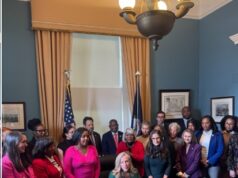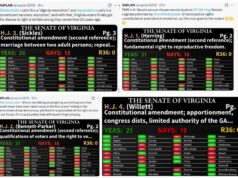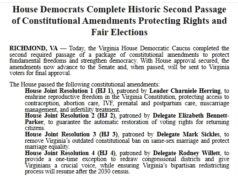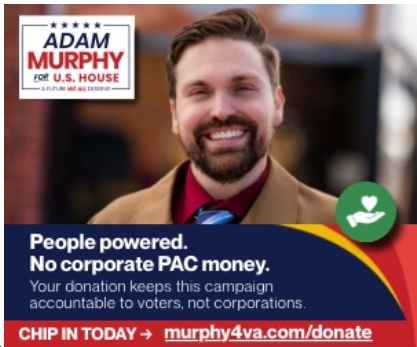From the disAbility Law Center of Virginia:
Virginia Agrees to Provide Accessible Absentee Voting Option for Voters with Print Disabilities
The Commonwealth Agrees to Consent Decree to Include Electronic Ballot Marking
beginning with the June 2021 Primary Election
April 19 2021 – Alexandria, VA – The Commonwealth of Virginia will permanently make its elections accessible and safe for voters who cannot mark a paper ballot privately and independently due to disabilities such as blindness, beginning with the June 2021 Primary Election.
On July 27, 2020, several voters with disabilities, the American Council of the Blind of Virginia, and the National Federation of the Blind of Virginia filed a complaint in the Eastern District of Virginia against the Commonwealth for violations of the Americans with Disabilities Act, Section 504 of the Rehabilitation Act, and the Virginia Disabilities Act.
In August 2020, Virginia agreed to provide an absentee ballot option that is accessible and can be marked electronically so that voters with disabilities could safely vote in the November 2020 general election.
“We are pleased that the Commonwealth of Virginia recognizes that reducing barriers to absentee voting improved the November 2020 election and is committed to offering a secure remote absentee voting option moving forward,” said Maggie Hart, Counsel at the Washington Lawyers’ Committee. “The right to vote is precious and our democracy will only be strengthened by increasing access to the ballot.”
Judge Hilton of the Eastern District of Virginia entered a final consent decree agreed upon by the parties, which extends Virginia’s obligation to provide a remote accessible vote by mail tool for the primary election on June 8, 2021. Virginia will also appoint an ombudsman to assist voters with disabilities to use the accessible electronic ballot. Virginia has also adopted a new voting rights law, which takes effect July 1, 2021, to make the accessible absentee ballot option permanent.
Sam Joehl, President of the American Council of the Blind of Virginia stated: “We are delighted that the Virginia Department of Elections will be implementing an accessible remote ballot marking solution for the July 2021 election, and we commend the legislature for recognizing the need for accessible remote voting by incorporating this mandate into the laws of the state. The recent health pandemic illustrated the criticality for voters with print disabilities to be able to independently cast a remote ballot, which is an option that every other voter can exercise. We stand ready to work with the Board of Elections to widely promote the availability of this solution, and to assist them in educating the local registrars to implement the accessible remote ballot marking system so that those who wish to avail themselves of it can do so without issue.”
As we fight for accessible absentee and mail-in ballots across several states and in the United States congress, we are pleased that Virginia is among the states where the right of blind voters to mark our absentee ballots safely, privately and independently is secure,” said Tracy Soforenko, president of the National Federation of the Blind of Virginia. “We urge all blind Virginians to exercise this cherished and fundamental right.”
Colleen Miller, the Director of the disAbility Law Center of Virginia, stated, “dLCV is proud to be part of Virginia’s movement towards greater and greater access to voting, especially for people with disabilities. And Virginia can now proudly claim its position as the leader among southern states for voting access.”
“My clients are courageous individuals with print disabilities who can now engage in activities many of us take for granted,” said Steven Hollman of Sheppard Mullin. “That’s why it is especially gratifying to help ensure that they will be able to exercise the most cherished right offered in a democracy – the right to vote privately and independently — on equal terms with other voters.”
The lawsuit was filed by the American Council of the Blind of Virginia, the National Federation of the Blind of Virginia and Carshena Gary, Lori Scharff, Regina Root, Ph.D., Naim Muawia Abu-El Hawa, and John Halverson, Ph.D.
Link to the Consent Judgment & Decree here.
Link to filed complaint here.
Counsel for this case include Eve L. Hill of Brown Goldstein & Levy, the disAbility Law Center of Virginia, Sheppard, Mullin, Richter & Hampton, LLP, and the Washington Lawyers’ Committee for Civil Rights & Urban Affairs.
###
About American Council of the Blind (ACB): The American Council of the Blind is a national grassroots consumer organization representing Americans who are blind and visually impaired. With 70 affiliates, ACB strives to increase the independence, security, equality of opportunity, and to improve quality of life for all blind and visually impaired people. Learn more by visiting www.acb.org.
About Brown Goldstein and Levy: BGL provides the highest quality legal services to a broad range of clients, without sacrificing our sense of community and social responsibility. By elevating our clients’ voices and fighting for their rights, we seek to bring about a more just world – sometimes one dispute at a time, sometimes through systemic change.
About the disAbility Law Center of Virginia: disAbility Law Center of Virginia is the protection and advocacy agency charged by the state and federal governments, on behalf of people with disabilities, to advance independence, choice and self-determination; protect legal, human and civil rights; and eliminate abuse, neglect and discrimination of people with disabilities through zealous and uncompromising legal advocacy and representation.
About National Federation of the Blind (NFB): The National Federation of the Blind (NFB), headquartered in Baltimore, defends the rights of blind people of all ages and provides information and support to families with blind children, older Americans who are losing vision, and more. Founded in 1940, the NFB is the transformative membership and advocacy organization of blind Americans with affiliates, chapters, and divisions in the fifty states, Washington DC, and Puerto Rico. We believe in the hopes and dreams of blind people and work together to transform them into reality. Learn more about our many programs and initiatives at nfb.org.
About Sheppard, Mullin, Richter & Hampton LLP: Sheppard Mullin is a full-service Global 100 firm with more than 950 attorneys in 15 offices located in the United States, Europe and Asia. Since 1927, industry-leading companies have turned to Sheppard Mullin to handle corporate and technology matters, high-stakes litigation and complex financial transactions. In the U.S., the firm’s clients include almost half of the Fortune 100. For more information, please visit www.sheppardmullin.com.
About the Washington Lawyers’ Committee: Founded in 1968, The Washington Lawyers’ Committee for Civil Rights and Urban Affairs works to create legal, economic and social equity through litigation, client and public education and public policy advocacy. While we fight discrimination against all people, we recognize the central role that current and historic race discrimination plays in sustaining inequity and recognize the critical importance of identifying, exposing, combatting and dismantling the systems that sustain racial oppression. For more information, please visit http://www.washlaw.org or call 202.319.1000. Follow us on Twitter at @WashLaw4CR.












![Video: Ivy Main Says “the hostility to offshore wind is really just [Trump]; nobody else feels this way…he will be gone and then we will get back on track”](https://bluevirginia.us/wp-content/uploads/2026/02/axiosivymain-100x75.jpg)